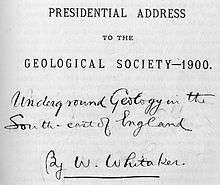William Whitaker (geologist)
William Whitaker was born on 4 May 1836 in London,[1]
William Whitaker | |
|---|---|
 | |
| Born | 4 May 1836 London |
| Died | 15 January 1925 Croydon |
| Nationality | British |
| Alma mater | University College, London |
| Known for | Hydrogeology |
| Spouse(s) | Mary Whitaker (Nee Keogh) |
| Awards | Murchison Medal (1886) Prestwich Medal (1906) Wollaston Medal (1923) |
| Scientific career | |
| Fields | Geologist |
Early life
He was educated at St Albans School and University College, London, where he gained a degree in chemistry in 1855.
Career
He became a geologist, specializing initially in water surveying and mapping. His thorough research, wide knowledge, and his numerous publications, especially his The Geology of London and of Part of the Thames Valley (1889) has led some to call him “the father of English hydrogeology”. He retired in 1896 but continued to work as a water engineer.
... The long lines of escarpment which stretch across several parts of England were formerly considered to be undoubtedly ancient coast-lines; but now we know that they stand up above the general surface merely from resisting air, rain and frost better than the adjoining formations. It has rarely been the good fortune of a geologist to bring conviction to the minds of his fellow-workers on a disputed point by a single memoir; but Mr. Whitaker, of the Geological Survey of England, was so fortunate when, in 1867, he published his paper "On sub-aerial Denudation, and on Cliffs and Escarpments of the Chalk." ....[2]
Honours
He was elected fellow of the Geological Society in 1859, and FRS in 1883. He was president of numerous societies, including both the Geologists’ Association and the Geological Society, and was a recipient of the latter’s Murchison Medal in 1886 and Wollaston Medal in 1923. He died in Croydon, Surrey on 15 January 1925,.[3]
Further reading
Oxford Dictionary of National Bibliography
References
- "WHITAKER, William". Who's Who. Vol. 57. 1905. p. 1719.
- Darwin, Charles (1896). The formation of vegetable mould, through the action of worms, with observations on their habits. New York: D. Appleton & Co. p. 232.
- Transactions of the Institution of Mining Engineers. Vol. LXIX.- 1924-1925, London 1925, page 200
- Entry in Who's Who
- W. H. George: entry in Oxford Dictionary of National Biography